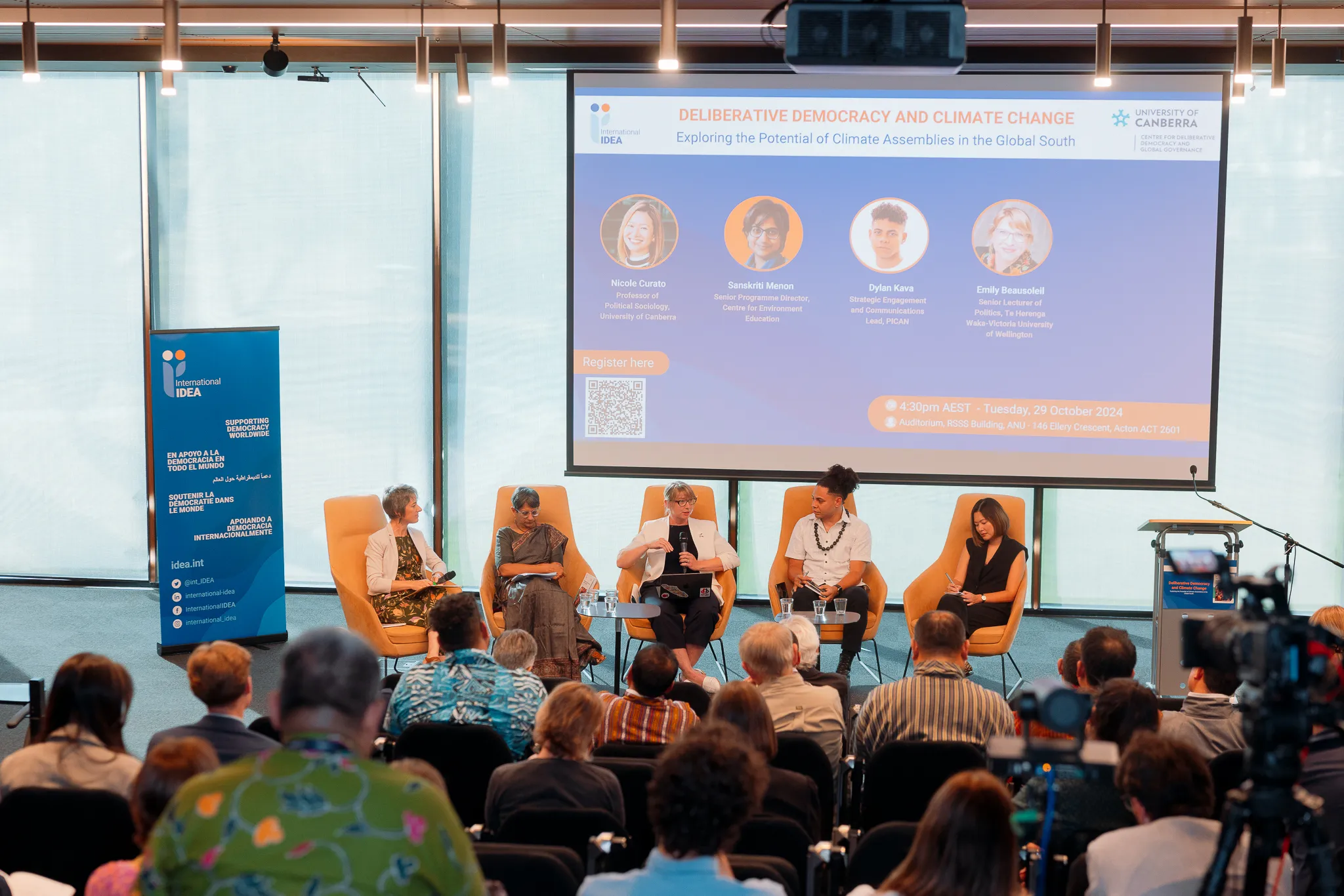
“We need a new story of deliberative democracy” – IDEA launches new report on Climate Assemblies

Acknowledging that climate change is the defining challenge of our time, International IDEA was pleased to launch the “Deliberative Democracy and Climate Change: Exploring the Potential of Climate Assemblies in the Global South” report in Canberra, Australia on 29 October, 2024. Convened at the Australian National University, the panel featured scholars and activists who discussed the findings of the report as well as the merits, and challenges, of implementing citizen-led deliberative assemblies in different cultural contexts.
Many feel that climate action since the 2015 Paris Agreement has been insufficient despite the availability of actionable solutions. With the impacts of climate change already felt by countless communities around the world, democracy must rise as the most credible and effective political system within which to address climate-related crises. “Climate assemblies are an example of such innovation, directly involving citizens in shaping climate policy. They have the potential to elevate climate ambition while lending greater legitimacy to the tough decisions required” remarked Leena Rikkilä Tamang, Director for Asia and the Pacific, International IDEA.
In her opening presentation, lead author Nicole Curato of the Centre for Deliberative Democracy and Global Governance at the University of Canberra made the case that our current environmental problems are so complex, “we cannot afford the leave the decision-making in the hands of experts, government agencies, and politicians alone.” She noted that the reality in many countries features “patronage and corporate greed” that drives policy instead of deliberative policy making informed by evidence. Curato pointed to the history of deliberative practices in the Global South, particularly in the wake of storms and other climate-related natural disasters. She highlighted one of the central messages of the report: that people in the Global South do not need to be taught how to engage in deliberative practices, but rather that those in the Global North stand to learn the most about this democratic method of deliberation.

Speaking from the Indian context, Dr Sanskriti Menon of the Centre for Environment Education said climate-focused assemblies are a tool to amplify the voices of villagers affected by climate change. She compared deliberative assemblies to Saris – of which “there are many ways to wear it,” describing it as a “flexible tool, that comes alive in the hands of the user” and can be adapted to the needs of the local context and people.
Shedding light on the experiences of Pacific nations, Dylan Kava, of the Pacific Islands Climate Action Network (PICAN) said that unlike some nations, Pacific Islanders are largely aligned with policymakers on environmental and climate issues.
“We actually do have leaders that throw their weight behind ambitious climate policy, and so, we have these connections with our governments and there is already [deliberative] work that is happening on the ground,” he told the audience.
Responding to Dylan’s contrast of the north and south experience, Emily Beausoleil of Te Herenga Waka-Victoria University of Wellington highlighted one misconception about the difficulties associated with climate assemblies.
“I was reading this report and was thinking about how when there’s this Western conversation about the global north and deliberation, the limits or challenges are often pitched in terms of when it comes up against illiberal or undemocratic challenges … that curtail the quality of deliberation. I would just like to offer that the challenges also stem from how deep difference can go in our ontologies and in our epistemologies,” she said.
Addressing one of the key features of many civic assemblies – the process of sortition – Beausoleil noted that in some cultures, randomness constrains rather than enhances trust.
“Some push back that I witnessed in this context is actually not to do with traditional authority or a lack of trust of familiarity, but it’s more to do with a fundamental clash between the deliberative demand for randomness and the Indigenous demand for relationality,” she said, adding that in Indigenous-led designs in the Pacific, many steps need to be taken before meaningful dialogue can commence.
Concluding the panel discussion, Curato said that the report is “not a sales pitch for citizen’s assemblies” and that in reality, we need a “new story of deliberative democracy, one that is not imported from the Global North cascading down to the Global South.”
Following a series of questions from the audience, notably around design and implementation of climate assemblies, Kirsten Bishop, Acting First Assistant Secretary of the Development Effectiveness and Enabling Division at the Department of Foreign Affairs and Trade of Australia, offered concluding remarks.
“Our approach to development cooperation is well aligned with the principles and practices of deliberative democracy and climate assemblies, some of which we’ve heard about this afternoon,” she said, after reiterating the Australian government’s commitment to the Asia and the Pacific region and noting their focus on “genuine partnership” which is locally led development action.
“The imperative for accelerated climate action is clear, given the region’s complex constellation of risks from climate and geohazards … and for this reason Australia is committed to climate action,” she said. “Our engagement with the region on climate action is the result of years of important conversations across the region spanning differing opinions and expectations of Australia’s role.”





